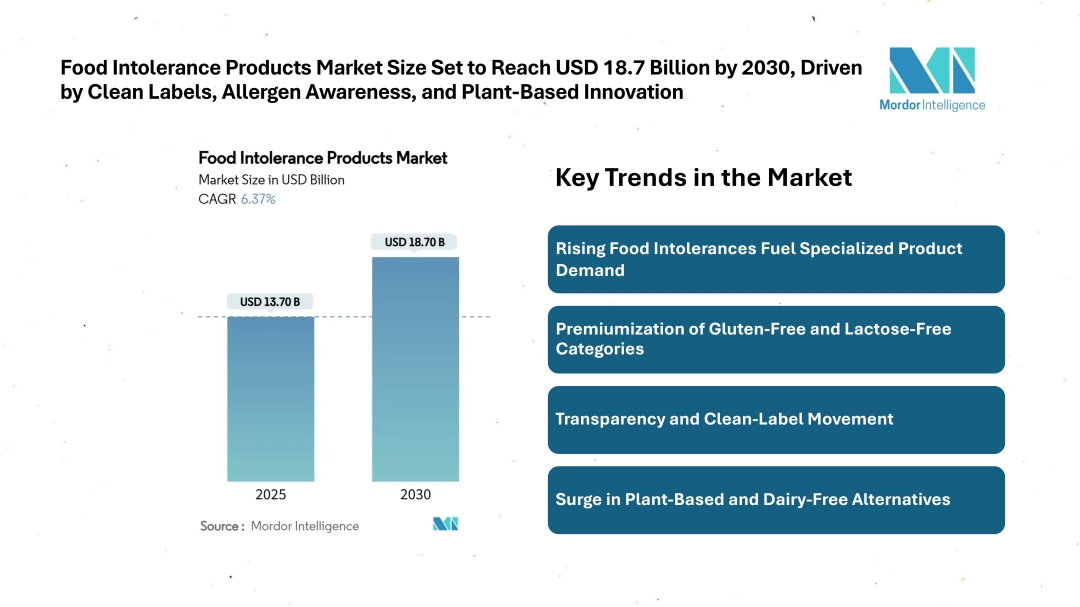Introduction – Rising Health Awareness and Regulatory Clarity Power the Food Intolerance Products Market
According to the latest insights from the Food Intolerance Products Market Report by Mordor Intelligence, the global food intolerance products market size is estimated at USD 13.7 billion in 2025 and is expected to reach USD 18.7 billion by 2030, growing at a CAGR of 6.37% during the forecast period. This expansion reflects a significant consumer shift toward health-focused and allergen-free diets. The rise in food intolerances such as lactose intolerance, gluten sensitivity, and celiac disease has driven strong demand for “free-from” and functional food products. Increasing awareness of gut health, clean eating, and personalized nutrition is pushing both established manufacturers and startups to innovate ingredient sourcing, labeling, and product development.
Governments and food safety agencies are implementing stricter labeling regulations to ensure transparency and protect consumers with sensitivities. While North America leads due to mature regulations and consumer education, the Asia-Pacific region is emerging as the fastest-growing market, driven by urbanization, digital retail adoption, and expanding health-conscious middle-class consumers.
Key Market Trends – Growth Anchored by Allergen-Free Innovation and Consumer Transparency
1. Rising Food Intolerances Fuel Specialized Product Demand
Global health data indicate a consistent increase in diagnosed food intolerances and allergies. As a result, manufacturers are reformulating bakery, dairy, and snack items to eliminate common allergens while maintaining taste and texture. Enhanced regulatory clarity, including the U.S. FDA’s gluten-free labeling standards, continues to strengthen consumer confidence and facilitate new product development.
2. Premiumization of Gluten-Free and Lactose-Free Categories
What was once a medical necessity has evolved into a lifestyle preference. Premium gluten-free and lactose-free options now appeal to broader audiences seeking nutrition-rich, protein-fortified, and indulgent alternatives. Brands are focusing on superior texture, flavor, and clean nutrition to ensure that “free-from” foods rival traditional counterparts in both taste and health value.
3. Transparency and Clean-Label Movement
The global “clean label” trend continues to reshape food purchasing behavior. Consumers increasingly evaluate ingredient lists and allergen declarations before buying. Transparent packaging, traceable ingredient sourcing, and clear allergen labeling have become crucial differentiators, particularly in developed markets and among younger, health-aware demographics.
4. Surge in Plant-Based and Dairy-Free Alternatives
The integration of plant-based diets with allergen-free innovation is reshaping the competitive landscape. Ingredients like pea protein, almond milk, and oat-based dairy substitutes are gaining traction. Moreover, precision fermentation and sustainable protein technologies are enabling manufacturers to replicate traditional dairy taste profiles without allergens, aligning with sustainability goals and ethical consumption trends.
Read the full report and access market snapshots that include both global views and Japan-specific analysis – https://www.mordorintelligence.com/ja/industry-reports/food-intolerance-products-market?utm_source_abnewswire
Market Segmentation – Detailed Insights into Food Intolerance Product Categories
By Product Type
- Dairy and Dairy Alternatives
- Bakery Products
- Confectionery Products
- Meat and Seafood Products
- Sauces, Condiments and Dressings
- Other Product Types
By Labeling Type
- Gluten-Free Food
- Lactose-Free Food
- Others
By Category
- Conventional
- Organic
By Distribution Channel
- Supermarkets/Hypermarkets
- Health-Food Stores
- Convenience and Grocery Stores
- Online Retail Stores
- Others
By Geography
- North America
- Europe
- Asia-Pacific
- South America
- Middle East and Africa
Competitive Landscape – Innovation, Acquisitions, and Certification Drive Market Leadership
- General Mills Inc.
- Danone S.A.
- Abbott Laboratories
- Nestlé S.A.
- Arla Foods amba
Leading companies are prioritizing R&D investments, acquisitions, and sustainability partnerships to diversify their free-from portfolios. Innovations such as gluten-free dumplings, vegan cookies, fortified cereals, and dairy-free beverages highlight the industry’s focus on balancing flavor, function, and health.
Smaller brands are capturing niche segments, such as nut-free, keto-friendly, or organic gluten-free products, by leveraging contract manufacturing partnerships and local ingredient sourcing. Market competition increasingly revolves around three strategic pillars: sensory quality, transparent communication, and omnichannel presence.
Our Trending Reports
Cashew Milk Market – The Global Cashew Milk Market is Segmented by Product Type (Unflavored Cashew Milk and Flavored Cashew Milk), by Nature (Conventional and Organic), by Packaging Type (Bottles, Cartons, Pouches, Jars, Cans, and Others), by Distribution Channel (Foodservice/HoReCa and Retail), and by Geography (North America, South America, Europe, Asia-Pacific, and Middle East and Africa).
Hazelnut Milk Market – The Hazelnut Milk Market Report is Segmented by Category (Conventional, Organic), Flavor (Unflavored, Flavored), Packaging (Cartons/Tetra Pak, Bottles, Cans, Pouch), Distribution Channel (Food Service, Retail), and Geography (North America, Europe, Asia-Pacific, South America, Middle East and Africa).
Lactose Intolerance Treatment Market – The Lactose Intolerance Treatment Market Report is Segmented by Treatment Type (Lactase Supplements, Probiotic & Synbiotic Formulas, and More), Formulation (Tablets & Capsules, Drops, and More), Distribution Channel (OTC Pharmacies & Drug Stores, and More), Patient Age Group (Infants, Children, and More), and Geography (North America, Europe, Asia Pacific, and More).
About Mordor Intelligence:
Mordor Intelligence is a trusted partner for businesses seeking comprehensive and actionable market intelligence. Our global reach, expert team, and tailored solutions empower organizations and individuals to make informed decisions, navigate complex markets, and achieve their strategic goals.
With a team of over 550 domain experts and on-ground specialists spanning 150+ countries, Mordor Intelligence possesses a unique understanding of the global business landscape. This expertise translates into comprehensive syndicated and custom research reports covering a wide spectrum of industries, including aerospace & defense, agriculture, animal nutrition and wellness, automation, automotive, chemicals & materials, consumer goods & services, electronics, energy & power, financial services, food & beverages, healthcare, hospitality & tourism, information & communications technology, investment opportunities, and logistics.
Media Contact
Company Name: Mordor Intelligence Private Limited
Contact Person: Jignesh Thakkar
Email: Send Email
Phone: +1 617-765-2493
Address:11th Floor, Rajapushpa Summit, Nanakramguda Rd, Financial District, Gachibowli
City: Hyderabad
State: Telangana 500008
Country: India
Website: https://www.mordorintelligence.com/industry-reports/food-intolerance-products-market?utm_source=abnewswire

